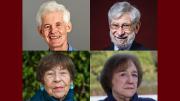The Graduate School of Arts and Sciences Centennial Medal, first awarded in 1989 on the occasion of the school’s hundredth anniversary, honors alumni who have made contributions to society that emerged from their graduate study at Harvard. It is the highest honor the Graduate School bestows, and awardees include some of Harvard’s most accomplished graduates. The 2020 recipients are:
Stephen Cook, A.M. ’62, Ph.D. ’66, Mathematics
Stephen Cook is a University Professor emeritus at the University of Toronto and a pioneer in the field of computational complexity. He received the Turing Award in 1982. Cook’s work has helped define which problems computers can solve, and which are unsolvable—key questions in fields such as cryptography, which keeps data secure. His 1971 paper, “The Complexity of Theorem Proving Procedures,” formulated what has been called the most famous problem in computer science: whether the most optimally efficient algorithm can be found for every optimization problem for which answers can be verified. Cook thinks not—that there are optimization problems that can’t be solved by efficient algorithms. Proving that conjecture either true or false is one of the seven famous unsolved Millennium Prize Problems in mathematics.
Gordon McKay professor of computer science Harry Lewis says that Cook is “universally admired and respected in the field, in part because he marries his brilliance with humility. It is characteristic of Steve not to choose easy problems to work on. He picks the hardest problems there are and doesn’t give up on them.”
Albert Fishlow, Ph.D. ’63, Economics
Albert Fishlow, a professor emeritus at the University of California, Berkeley, and professor of international and public affairs at Columbia, is a development economist and economic historian of Brazil and Latin America. From 1970 to 1976, he served as deputy assistant secretary of state for inter-American affairs. In 1999, the Republic of Brazil awarded him the country’s highest honor, the National Order of the Southern Cross.
Former student Pedro Malan, an economist who later served as Brazil’s minister of finance, says “Brazil as a country, and Latin America as a region, owe much to him.”
Margaret Kivelson ’50, A.M. ’51, Ph.D. ’57, RI ’66, Physics
Margaret Kivelson is Distinguished Professor emerita of space physics at the University of California, Los Angeles, and a research professor in climate and space sciences and engineering at the University of Michigan. At Harvard, she was the only woman graduate student ever advised by Julian Schwinger. In a luminous and actively continuing career, she has worked for the European Space Agency and for NASA, where she studied planetary magnetospheres. That work led to the conclusion that frozen Europa, a moon of Jupiter, conceals a subsurface ocean.
Mallinckrodt professor of geophysics Jeremy Bloxham says, “It’s precisely because of her…that we’ve come to realize just how interesting Jupiter’s moons actually are.”
Helen Vendler, Ph.D. ’60, English and American Literature
Porter University Professor emerita Helen Vendler is a poetry critic and scholar of the highest order, and an authority on the poetry of Emily Dickinson, T.S. Eliot, Seamus Heaney, John Keats, John Milton, Sylvia Plath, Alexander Pope, Wallace Stevens, Walt Whitman, W.B. Yeats—and many others. (Read her 2012 reflection on how alumni interviewers should understand, attract, and evaluate applicants whose creative talents might otherwise be overlooked, given that these great poets might never be admitted to Harvard today.)
Gurney professor of English literature and professor of comparative literature James Engell says, “Helen is our greatest living critic of poetry in English. Her writing is acute, learned, accessible, and brilliant. She covers a tremendously wide swath of poetry from the earlier periods of English verse to yesterday and today. She is also a superb teacher who pays close attention to every line and every word that students write, offering constructive and detailed comments. Committed not only to enhancing her students’ understanding and appreciation of poetry, Helen helps them find their own voices on paper and in class. She is an inspiration to her students, a mentor to younger teachers, and the highest example for all colleagues.”
For more about the honorands, and to read the citations that accompanied the awarding of their Centennial Medals, see the Graduate School of Arts and Science webpage.
Read the citations here:









